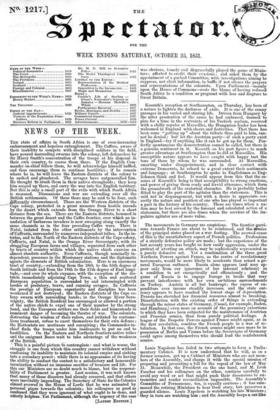Kossuth's reception at Southampton, on Thursday, has been of a
nature to lighten the darkness of exile. It is one of the sunny passages in his varied and stirring life. Driven from Hungary by the utter prostration of the cause he had embraced, doomed to pine for a time in the restraints of his Turkish asylum, received with a chilly repulse at Marseilles, the Hungarian leader has been welcomed in England with cheers and festivities. That there has been some "getting up" about the tribute thus paid to him, can- not be denied; but let the Austrian party—if such a party exist in England—try if anything like it can be got up for them. Per- fectly spontaneous the demonstration cannot be called, but there is a genuine sentiment in it. Kossuth on his part figures to much greater advantage at Southampton than he did at Marseilles. Ma susceptible nature appears to have caught with happy tact the tone of those by whom be was surrounded. At Marseilles smarting under disappointment, and in close contact with extreme Democrats' he echoed to a great extent their sentiments and language ; at Southampton he spoke to Englishmen as Eng- lishmen think and feel. It would appear from this that the es- sence of Kossuth's being is that susceptibility to strong emotions, and power of giving them ready and fervid utterance, which form the groundwork of the oratorical character. He is probably better fitted to play the part of the agitator than the statesman. This is said not in disparagement, but with a desire to appreciate cor- rectly the nature and position of one who has played so important a part in the history of his country. There are times when a na.- tion may be best served by the forecast and calculated action of a statesman, but there are also times when the services of the im- pulsive agitator are of more value.


























